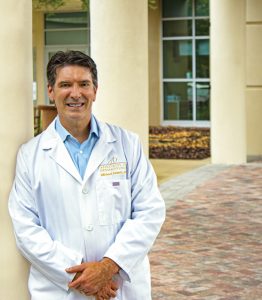Protecting The Skin You’re In
As the summer sun beats down on Central Florida, staying cool and protected from the abundant sunshine’s harmful rays should be at the forefront of everyone’s minds. After all, one bad sunburn isn’t just a temporary inconvenience: Skin damage accumulates with time, and each burn increases your risk of skin cancer.
The 17-location, award-winning team at Associates in Dermatology, led by president and medical director Dr. Michael Steppie, are longtime advocates of proper skincare. To keep their patients’ skin, hair and nails looking and feeling their best, the practice delivers a full range of general dermatological, clinical and cosmetic procedures.
But their biggest focus is on skin cancer. Educating Floridians of all ages on how to stay protected on land and in the water aids in their mission to prevent skin cancer entirely.
“Nobody’s perfect: Sunburns do happen,” says Dr. Steppie. But he adds that it’s crucial to ensure those accidental burns don’t happen again, however, as even one that happens in childhood or adolescence more than doubles a person’s chances of developing melanoma—the deadliest form of skin cancer—later in life. That’s why protecting your family from the sun not only keeps your children’s delicate skin safe now but also teaches them positive lifelong habits.
Summertime excursions to the beach or pool might help keep the heat at bay but they can usher in some especially nasty burns. Splashing in the water and feeling the breeze on wet skin can create the deceptive perception of a cooler day, lulling a person into a false sense of security of being protected until the sun blisters and burns start to form. The reflective nature of water and sand also amplify the effects of the sun’s rays, and even the most waterproof sunscreen is no match for sweat and hours spent in a pool, water park, lake or ocean.
But sunscreen is rarely enough on its own, which is why clothing is one of the most important factors to consider when seeking sun protection, and polyester, nylon, wool, silk and denim are all effective sun-blocking fabrics. Everything from wide-brimmed hats to long-sleeved shirts to long pants can provide whole-body protection.
Optimally, you can select garments that provide an ultraviolet protection factor (UPF), which are becoming increasingly popular and available in all kind of lightweight, breathable fabrics that keep you cool while ensuring your skin’s all covered. Look for the Skin Cancer Foundation’s seal of recommendation to ensure your summer-appropriate pants, tops and cover-ups have a UPF of 50+, indicating that they keep at least 97.5% of ultraviolet rays from touching your skin as you swim, fish, golf and enjoy outdoor activities again.
Dr. Steppie isn’t just all about keeping everyone safe and healthy as they go out and enjoy all that the Orlando region has to offer, which is why he was the proud sponsor of the Frontyard Festival presented by AdventhHealth, which was held at the Dr. Phillips Center for the Performing Arts last May.
“After months of sheltering in place because of the pandemic, this event offered one-of-a-kind live outdoor entertainment experience that I was so glad to help bring to the community,” he says.
But the global shut-down also had families forgoing doctor appointments out of fear of exposing themselves and their loved ones to the novel coronavirus if they sought other medical treatments. Organizations like the National Comprehensive Cancer Network and American Cancer Society have reported a 46% drop nationally in new cancer detection during the pandemic, indicating something deeply worrisome in the wake of COVID.
“We recently received a letter from major U.S. cancers centers raising awareness to the fact that many cancers are going undiagnosed, with skin cancer being one of them,” Dr. Steppie notes. “These trends are distressing because they tell us many cancers are going both undiagnosed and untreated. It’s important and highly recommended to return to your regular skin care, like full-body exams and skin checkups. Those cancer screenings and treatments save lives.”
At the beginning of 2021, major cancer centers predicted 101,280 cases of non-invasive melanoma would be diagnosed this year; since one in five Americans will be diagnosed with skin cancer during their lifetimes, diligent checkups examining their skin from head to toe are among the best ways to stay ahead of a cancer that can be treated successfully with the benefit of early detection.
“I urge everyone to resume their regular checkups, regular skin cancer screenings and skin exams,” says Dr. Steppie. “We need to remember that skin cancer didn’t take a break during the pandemic.”
 Dr. Steppie has compiled some tips to help families enjoy the summer while avoiding the long-terms dangers of sunburns:
Dr. Steppie has compiled some tips to help families enjoy the summer while avoiding the long-terms dangers of sunburns:
- Newborns should always be kept out of direct sunlight! Babies older than six months can wear a mineral sunscreen with a high SPF of at least 30.
- Apply sunscreen to all exposed skin year-round—even on overcast days, since the clouds still diffuse harmful UV rays even if the sun isn’t shining directly on you.
- Fifteen minutes before you go outside, apply a mineral sunscreen of least SPF 30 and that protects from UVA/UVB rays. Reapply every two hours, but especially after swimming or sweating.
- Opt for a long-sleeved shirt, pants, a wide-brimmed hat and UV-blocking sunglasses. The best sun-protective clothes, accessories and swimwear carry a UPF 50+ label.
- The sun’s rays are the strongest between 10 a.m. and 4 p.m., but seeking shade whenever possible is a good practice.
Multiple locations in Central Florida Including Celebration • Dr. Phillips • Hunter’s Creek • Ocoee
(800) 827-7546 | DermOrlando.com









